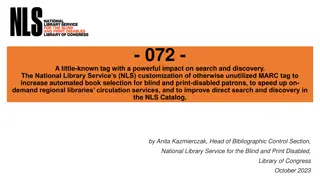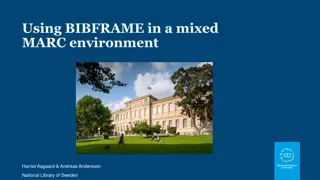
Visual C++ 2015 Preview Highlights
Discover the latest features in Microsoft Visual C++ 2015 Preview, including advancements in C++11, C++14, and C++17, productivity improvements, enhanced performance, and increased standard compliancy. Learn about core language features such as ref-qualifiers, rvalue references, and the contrived examples to understand the practical application of these new capabilities.
Download Presentation

Please find below an Image/Link to download the presentation.
The content on the website is provided AS IS for your information and personal use only. It may not be sold, licensed, or shared on other websites without obtaining consent from the author. If you encounter any issues during the download, it is possible that the publisher has removed the file from their server.
You are allowed to download the files provided on this website for personal or commercial use, subject to the condition that they are used lawfully. All files are the property of their respective owners.
The content on the website is provided AS IS for your information and personal use only. It may not be sold, licensed, or shared on other websites without obtaining consent from the author.
E N D
Presentation Transcript
What's new in What's new in Microsoft Visual C++ 2015 Preview Microsoft Marc Gr goire marc.gregoire@nuonsoft.com http://www.nuonsoft.com/ http://www.nuonsoft.com/blog/ Microsoft Extended Experts Team Member December 17th2014
Agenda C++11, C++14, C++17 Productivity Improvements Improved Performance C++ Cross-Platform Mobile Dev
C++11, C++14, C++17 Increased standard compliancy
C++11 Core Language Features New or updated C++11 core language features ref-qualifiers Partial support for constexpr Inheriting constructors char16_t and char32_t Unicode string literals User-defined literals Full defaulted and deleted functions support (partial in VC++2013) Extended sizeof() noexcept Inline namespaces Full Rvalue references compliant (partial VC++2013) Full alignment support (partial in VC++2013) Unrestricted unions
ref-qualifiers rvalue references are well-known for function parameters, example: void foo(Bar&& bar); How to apply rvalue reference to *this? class Foo { void f1() const; // *this is const void f2() &; // *this is an lvalue void f3() &&; // *this is an rvalue };
ref-qualifiers Contrived Example class BigObject {}; class BigObjectFactory { public: BigObject Get() { return m_bigObject; } private: BigObject m_bigObject; }; BigObjectFactory aFactory; BigObject obj = aFactory.Get();
ref-qualifiers Contrived Example But what with this: BigObject obj = BigObjectFactory().Get(); The factory is a temporary object, but BigObject is still copied because *this is not an rvalue-reference Solution: Make BigObject moveable Overload Get() for an rvalue-reference *this
ref-qualifiers Contrived Example class BigObject {}; class BigObjectFactory { public: BigObject Get() const & { return m_bigObject; // Deep copy } BigObject Get() && { // *this is an rvalue return std::move(m_bigObject); // move } private: BigObject m_bigObject; }; BigObject o2 = BigObjectFactory().Get();// Move // *this is an lvalue BigObjectFactory myFactory; BigObject o1 = myFactory.Get(); // Deep copy
constexpr Constant expressions Simple example static constexpr size_t FACTOR = 2; constexpr size_t CalculateArraySize(size_t base) { return base * FACTOR; } ... double arr[CalculateArraySize(123)];
Inheriting constructors class Base { public: Base(int data) : m_data(data) {} private: int m_data; }; class Derived : Base { public: Derived(const std::string& msg) : Base(1), m_msg(msg) {} private: std::string m_msg; }; ... Base b1(123); // OK Derived d1("Message"); // OK Derived d2(456); // NOT OK
Inheriting Constructors class Base { public: Base(int data) : m_data(data) {} private: int m_data; }; class Derived : Base { public: using Base::Base; Derived(const std::string& msg) : Base(1), m_msg(msg) {} private: std::string m_msg; }; ... Derived d2(456); // OK
char16_t and char32_t Existing character types: char: only 8 bits wchar_t: compiler-dependent size, not specified by C++ standard! hard to use for platform independent code New character types: char16_t and char32_t
char16_t and char32_t In total 4 character types: char: stores 8 bits; can be used to store ASCII, or as building block for UTF-8 encoded Unicode characters char16_t: stores at least 16 bits; building block for UTF- 16 encoded Unicode characters char32_t: stores at least 32 bits; building block for UTF- 32 encoded Unicode characters wchar_t: stores a wide character of a compiler dependent size and encoding
char16_t and char32_t A compiler can define the following new preprocessor defines: __STDC_UTF_32__: If defined then char32_t represents a UTF-32 encoding, otherwise it has a compiler dependent encoding. __STDC_UTF_16__: If defined then char16_t represents a UTF-16 encoding, otherwise it has a compiler dependent encoding. Both not defined in VC++2015 Preview
char16_t and char32_t New std::basic_string specializations: typedef basic_string<char> string; typedef basic_string<wchar_t> wstring; typedef basic_string<char16_t> u16string; typedef basic_string<char32_t> u32string;
char16_t and char32_t Unfortunately, support for char16_t and char32_t stops here No I/O stream classes support these new types No version of cout/cin/ for these types
Unicode String Literals New string literals: L: A wchar_t string literal with a compiler-dependent encoding u8: A char string literal with UTF-8 encoding u: A char16_t string literal, which can be UTF-16 if __STDC_UTF_16__ is defined by the compiler U: A char32_t string literal, which can be UTF-32 if __STDC_UTF_32__ is defined by the compiler
Unicode String Literals All can be combined with the R prefix for raw string literals: const char* s1 = u8R"(Raw UTF-8 encoded string literal)"; const wchar_t* s2 = LR"(Raw wide string literal)"; const char16_t* s3 = uR"(Raw char16_t string literal)"; const char32_t* s4 = UR"(Raw char32_t string literal)";
User-Defined Literals C++ has standard literals such as: 'a': character "character array": zero-terminated array of characters, C-style string 3.14f: float floating point value 0xabc: hexadecimal value
User-Defined Literals Start with _ Implemented in a literal operator: Raw mode: op receives sequence of characters Cooked mode: op receives an interpreted type Example: literal 0x23 Raw mode op receives 0 , x , 2 , 3 Cooked mode op receives the integer 35
User-Defined Literals Cooked Mode Has 1 parameter to process numeric values Type can be unsigned long long, long double, char, wchar_t, char16_t or char32_t or 2 parameters to process strings a character array the length of the character array example: (const char* str, size_t len)
User-Defined Literals Cooked Mode Example: cooked mode complex number literal std::complex<double> operator"" _i(long double d) { return std::complex<double>(0, d); } std::complex<double> c1 = 9.634_i; auto c2 = 1.23_i; // type is std::complex<double>
User-Defined Literals Cooked Mode Example: cooked mode std::string literal std::string operator"" _s(const char* str, size_t len) { return std::string(str, len); } std::string str1 = "Hello World"_s; auto str2 = "Hello World"_s; // type is std::string auto str3 = "Hello World"; // type is const char*
User-Defined Literals Raw Mode Example: raw mode complex number literal std::complex<double> operator"" _i(const char* p) { // Implementation omitted; it requires parsing the C-style // string and converting it to a complex number. }
Full Defaulted and Deleted Functions Support =default Ask the compiler to forcefully generate the default implementation Example: class C { public: C(int i) {} C() = default; };
Full Defaulted and Deleted Functions Support =delete Forcefully delete an implementation Error message states intent, better error message than making it private without implementation Example: class C { public: C() = delete; C(const C& src) = delete; C& operator=(const C& src) = delete; }; C c;//error C2280:'C::C(void)': attempting to reference a deleted function
Full Defaulted and Deleted Functions Support =delete can be used to disallow calling a function with a certain type Example: void foo(int i) { } ... foo(123); foo(1.23); // Compiles, but with warning Disallow calling foo() with doubles by deleting a double overload of foo(): void foo(int i) { } void foo(double d) = delete; ... foo(123); foo(1.23); // error C2280: 'void foo(double)' : // attempting to reference a deleted function
Extended sizeof() sizeof() on class members without an instance Example: class Bar {}; class Foo { public: Bar m_bar; }; sizeof(Foo::m_bar);
noexcept Double meaning: noexcept to mark a function as non-throwing void func1(); // Can throw anything void func2() noexcept(expr); // A constant expression returning a Boolean // true means func2 cannot throw // false means func2 can throw void func3() noexcept; // = noexcept(true) If a noexcept-marked function does throw at runtime, terminate() is called Note that old exception specifications are deprecated since C++11
noexcept noexcept as an operator: noexcept(expr) Example: bool b1 = noexcept(2 + 3); // b1 = true bool b2 = noexcept(throw 1); // b2 = false void func1() { } bool b3 = noexcept(func1()); // b3 = false void func2() noexcept { } bool b4 = noexcept(func2()); // b4 = true Used by the standard library to decide between moving or copying Thus, mark your move ctor and move assignment operator noexcept
Inline Namespace Intended for libraries to support versioning Example: // file V98.h: namespace V98 { void f(int); // does something } // file V99.h: inline namespace V99 { void f(int); // does something better than the V98 version void f(double); // new feature } #include "MyLibrary.h" using namespace MyLibrary; // file MyLibrary.h: namespace MyLibrary { #include "V99.h" #include "V98.h" } V98::f(1); // old version V99::f(1); // new version f(1); // default version
C++11 Core Language Concurrency Features New or updated C++11 core language concurrency features quick_exit() and at_quick_exit() Full support for thread-local storage (partial in VC++2013) Magic statics
quick_exit() and at_quick_exit() quick_exit() terminates application as follows: Calls all functions registered with at_quick_exit() Terminates application Except at_quick_exit() handlers, no other cleanup is done No destructors are called
Thread-Local Storage Keyword: thread_local Each thread gets its own instance Example: thread_local unsigned int data = 1;
Magic Statics Thread-safe Magic statics Static local variables are initialized in a thread-safe way No manual synchronization needed for initialization Using statics from multiple threads still requires manual synchronization
Magic Statics Example: simple thread-safe singleton: static Singleton& GetInstance() { static Singleton theInstance; return theInstance; }
C++11 Core Language C99 Features New or updated C++11 core language C99 features __func__
__func__ Standard way to get the name of a function int _tmain(int argc, _TCHAR* argv[]) { cout << __func__ << endl; return 0; } Output: wmain
C++14 Core Language Features New or updated C++14 core language features Binary literals auto and decltype(auto) return types Lambda capture expressions Generic lambdas Digit separators (will be in RTM) Sized deallocation (partial support)
Binary Literals int value = 0b1111011; // = 123
auto and decltype(auto) Return Types Both auto and decltype(auto) can be used to let the compiler deduce the return type auto strips ref-qualifiers (lvalue and rvalue references) and strips cv-qualifiers (const and volatile) Decltype(auto) does not strip those
auto and decltype(auto) Return Types Example: return type will be int auto Foo(int i) { return i + 1; } Example: return type will be double template<typename T> auto Bar(const T& t) { return t * 2; } ... auto result = Bar<double>(1.2);
auto and decltype(auto) Return Types Multiple return statements are allowed but all need to be of exactly the same type Following won t compile returns int and unsigned int auto Foo(int i) { if (i > 1) return 1; else return 2u; }
auto and decltype(auto) Return Types Recursion allowed but there must be a non- recursive return before the recursive call Correct: auto Foo(int i) { if (i == 0) return 0; else return i + Foo(i - 1); } Wrong Wrong: auto Foo(int i) { if (i > 0) return i + Foo(i - 1); else return 0; }
decltype(auto) Quick reminder: static const string message = "Test"; const string& Foo() { return message; } ... Type: string Type: const string& Type: const string& auto f1 = Foo(); decltype(Foo()) f2 = Foo(); decltype(auto) f3 = Foo();
auto and decltype(auto) Return Types decltype(auto) as return type Example: decltype(auto) Foo2(const string& str) { return str; } auto Foo1(const string& str) { return str; } Return Type: string Return Type: const string& decltype(auto) a = Foo1("abc"); decltype(auto) b = Foo2("abc");
Lambda Capture Expressions Capture expressions to initialize lambda variables Example: float pi = 3.1415; auto myLambda = [myCapture = "Pi: ", pi]{ std::cout << myCapture << pi; }; Lambda has 2 variables: myCapture: a string (not from the enclosing scope) with value Pi: pi: captured from the enclosing scope
Lambda Capture Expressions Allow moving variables into the lambda Example: auto myPtr = std::make_unique<double>(3.1415); auto myLambda = [p = std::move(myPtr)]{ std::cout << *p; }; Lambda has 1 variable: p: a unique_ptr captured and moved from the enclosing scope (could even be called myPtr)
Generic Lambdas Lambda parameters can be declared as auto auto doubler = [](const auto& value){ return value * 2; }; ... vector<int> v1{ 1, 2, 3 }; transform(begin(v1), end(v1), begin(v1), doubler); ... vector<double> v2{ 1.1, 2.2, 3.3 }; transform(begin(v2), end(v2), begin(v2), doubler);
Digit Separators (will be in RTM) Single quote character Example: int number1 = 23'456'789; // The number 23456789 float number2 = 0.123'456f; // The number 0.123456


![textbook$ What Your Heart Needs for the Hard Days 52 Encouraging Truths to Hold On To [R.A.R]](/thumb/9838/textbook-what-your-heart-needs-for-the-hard-days-52-encouraging-truths-to-hold-on-to-r-a-r.jpg)



















